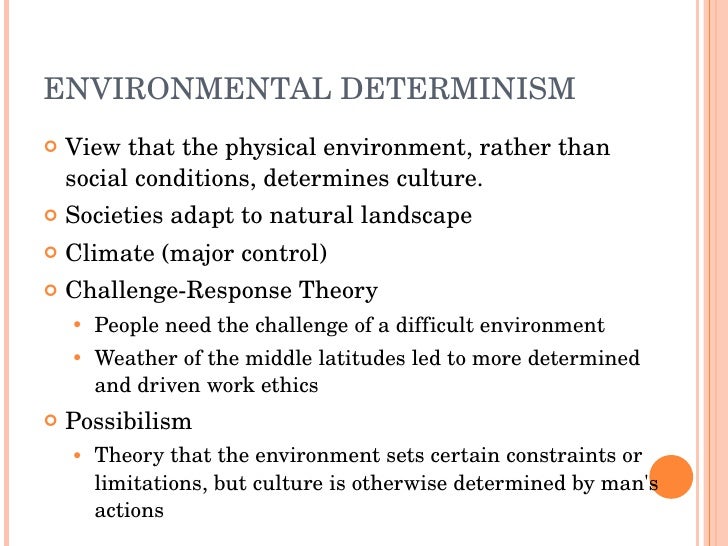
Determinism And Possibilism In Geography Pdf Notes Online
Jun 27, 2018 - The issue of environmental determinism and possibilism is still being debated for more than a Key. Man and environment relationship in geography pdf. Read Online Anna casanovas las reglas del juego pdf. Environmental determinism. Geographers reacted to this by first developing the softer notion of 'environmental possibilism,' and later by abandoning the search for theory and causal explanation for many decades. The experience of environmental determinism has left a scar on geography, with many geographers reacting negatively to any.
Environmental determinism, a concept we can trace to Greek and Arabic scholars, rests on the idea that the environment shapes the course of human development across various domains and at scales ranging from the individual to societies. It also figured prominently in the work of many Enlightenment‐era scholars including but not limited to Machiavelli and Montesquieu. During the early part of the twentieth century environmental determinism held a central if not dominant position within geography.
Although many geographers accepted its central tenants, the concept is most closely associated with the German geographer Friedrich Ratzel and with two Americans who studied under Ratzel, Ellen Churchill Semple, and Ellsworth Huntington. Adobe pdf reader for webos tv smart. Environmental determinism also held a central place in anthropological theory and has been embraced, although not so vigorously as in geography and anthropology, by several other social science disciplines and, perhaps obliquely, in the work of such prominent historians as Arnold Toynbee. Long abandoned by most geographers, environmental control as an organizing principle has been employed and popularized in development studies, mainly by scholars situated outside geography, a development that has attracted some criticism.
ADVERTISEMENTS: The radical approach in geography is only about twenty-five years old. Radicalism grew as a major criticism of quantitative geography, positivism and traditional regional geography. The origin of radical geography can be traced to the radical geography movement which started in the 1960s in the USA. There were three prominent issues of international concern behind the movement, viz., the Vietnam War, the civil rights movement of the Blacks, and the all-pervasive phenomenon of poverty in urban ghettos which generated social tension. ADVERTISEMENTS: The radicalists put emphasis on the need for a revolution in both theory and practice of geography. Thus, the radical approach is value-based, especially the theory of labour value, as against the supposedly value-free approaches. Radicalists stress that, with the changing production techniques, the symbiotic relationship between human beings and the environment also changes accordingly (a relationship from which the vital elements of the composition of society arise).

Radicalism believes in economic classes and the Subsequent class struggle as the cornerstone of historical materialism. Most of the radicalists have a strong Marxist base and take a holistic view of economics, society and polity. According to Peet (1977), radical geography grew, by and large, as a negative reaction to the established discipline. The main criticisms against radicalism are as follows: (i) Radicalism reduces human beings to a passive existence in the field of historical and structural determinism.
The exorcist tradition in islam pdf by bilal philips quotes about friendship. Rather than being a product of history, human beings become the creators of history. ADVERTISEMENTS: The reasons: (i) Marxist ideas themselves became subject to criticism. (ii) The collapse of Communist countries forced a rethinking on the matter. (iii) Radical geographers had no empirical study on the erstwhile Communist countries. (iv) Radicalism has become more professional and a substantial number of radicalists of the 1960s and the 1970s joined the ‘establishment’. By the end of the 1980s, some geographers like Peet and Thrift termed radicalism ‘the political- economy perspective’ whereas others like D. Harvey continued supporting its closeness to Marxist theories.